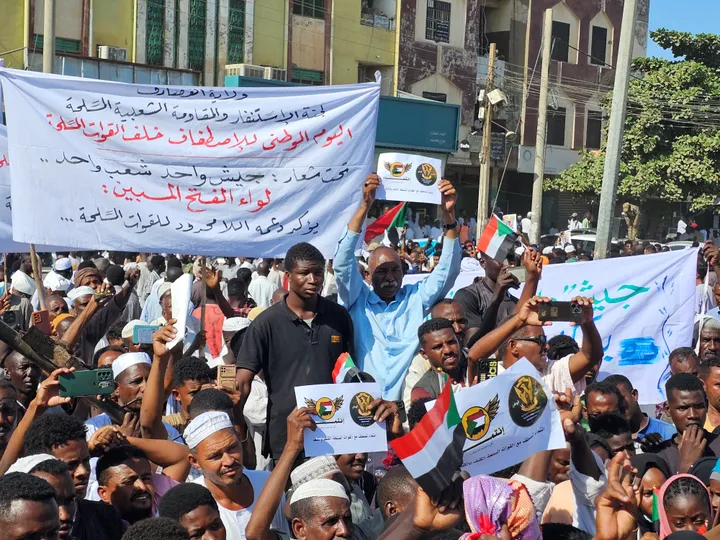By Abdulwasiu Hassan
The devaluation of the Nigerian naira has dealt a double whammy to citizens already battling the pangs of soaring inflation.
Salaried workers have been hit the hardest, with their net earnings sliding far behind the rising price curve.
In these uncertain times, comfort has come from unexpected quarters for a section of Nigerians involved in farming and selling hibiscus meant for export.
Bashir Tukur Abubakar is one of the lucky civil servants able to augment his salary with his weekend preoccupation – buying and selling hibiscus.
"What I make on the side is enough to cushion my salary even though I get to do business only over the weekend," he tells TRT Afrika.
Bashir travels to villages to buy hibiscus and sells the stock to exporters.
Most of the produce goes into making extracts, including an indigenous non-alcoholic drink called Zobo.
In Mexico, one of the largest importers of hibiscus, it is used in making a popular variant of "iced tea" alluringly named Agua de Jamaica.
Bashir isn't the only one benefiting from hibiscus blooming in the commodities market. Auwalu Ahmed is another Nigerian for whom business has been good so far.
"There are a lot of markets where hibiscus is sold in northern Nigeria, although you can't just buy some stock and hope to make a decent profit selling it," says Auwalu.
"There are trusted people you can give your money to, and they will go into the nooks and crannies of villages on your behalf to buy hibiscus from farmers."
A kilogram of hibiscus is sold for about 1,120 naira (approximately US $1). After accumulating some stock from the rural belt, intermediaries like Auwalu process the hibiscus and sell it to exporters.
Journey to Mexico
The bulk of Nigerian hibiscus is exported to Mexico where about 85% of the total export goes.
In 2017, the volume of exports proved counterproductive, causing such a glut in the market after Mexico banned the import of Nigerian hibiscus. The unexpected situation led to a lot of people losing big money.
Thankfully, the situation has changed for the better since, with the import of hibiscus from Nigeria to the Latin American nation resuming.
Nigeria's economy heavily relies on oil revenues but the authorities have been trying to diversify the economy including by boosting agriculture.
In late 2022, the then Nigerian ambassador to Mexico said that his country expected to earn $3 billion annually from exporting hibiscus to its largest consumer.
The recent devaluation of the naira has made the business even more lucrative for those involved.
"As the value of the US dollar appreciates in Nigeria, so does the price of hibiscus," Hashim Bello Dabai, a hibiscus trader, tells TRT Afrika.
Hashim has been in business in Kano, one of two commercial ports of call in Nigeria, since completing his secondary education in 2015.
"The main challenge I face is that of some sellers mixing their flowers with sand or stones to enhance the weight of their products packaged in sacks," he says.
Since adulterated hibiscus is a no-no for exporters, any rejection of stock results in a loss for local traders like Hashim.
The flip side
The fall in the value of the naira against the dollar is making many farmers prioritise cultivating export-oriented crops like sesame seeds and ginger, besides hibiscus.
Usman Muhammed, a farmer in Jigawa State, not only grows hibiscus but also buys additional stock from others to meet the export requirements of his regular buyers.
"I process the hibiscus before selling to exporters, who want only the best quality. Hibiscus is no longer a product in demand only within Nigeria. It has gone global," he says.
The export market has expanded to the extent that domestic commercial buyers who source it for Zobo soft drinks now have to compete with those whose interests lie abroad.
Security challenge
While hibiscus promises to be more rewarding for farmers and traders, some challenges remain.
"Despite the obvious potential of the business, neither the government nor investors seem interested in helping farmers scale up," says Usman.
Another challenge facing the sector is the general sense of insecurity plaguing some remote areas where hibiscus is cultivated.
This belt includes states like Jigawa, Borno, Yobe, Bauchi and Katsina, most of which have reported depredations by armed bandits in recent years.
The Nigerian government has made some progress in tackling these armed groups with the deployment of thousands of troops to the affected areas.
➤Click here to follow our WhatsApp channel for more stories.
























